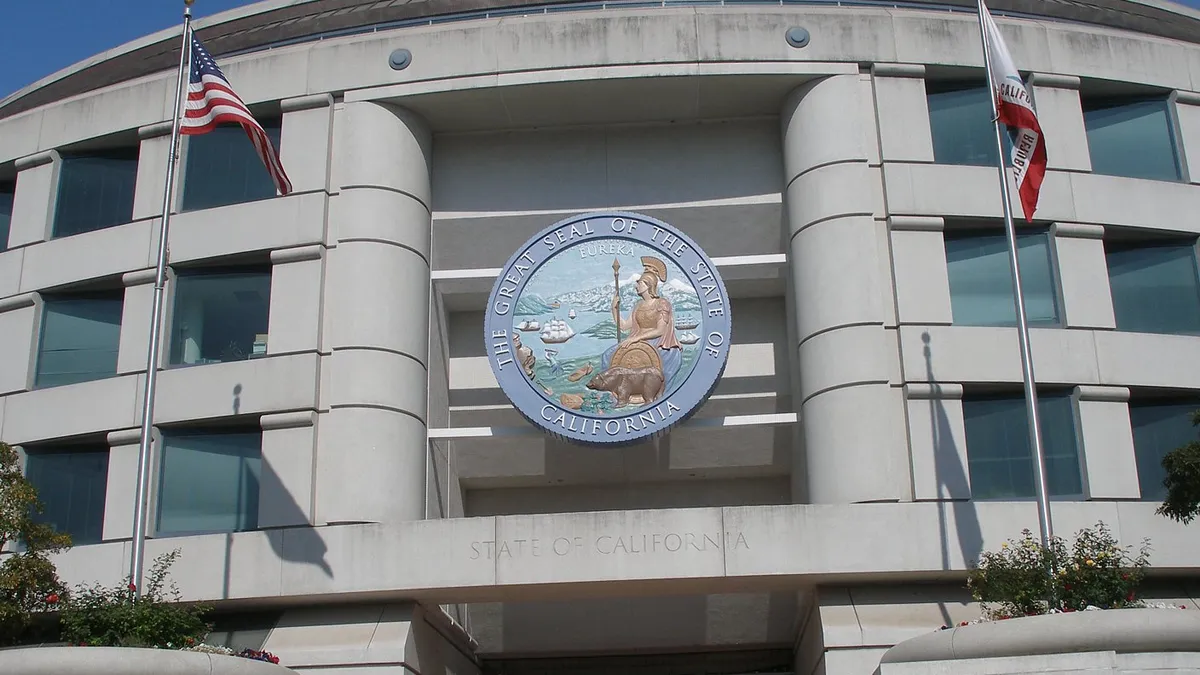Dive Brief:
- Southern California Gas Company (SoCalGas), the nation's largest gas utility, spent ratepayer funds on activities that "misaligned" with the energy efficiency codes and standards advocacy that regulators were aiming for, a California Public Utilities Commission (CPUC) administrative law judge concluded in an initial decision last week.
- The CPUC judge's decision, which states that SoCalGas committed "appreciable harm to the regulatory process," directed the utility to refund any ratepayer funds or shareholder incentives associated with this advocacy. If no parties appeal or request a review of the filing within 30 days, it will officially be adopted as a commission decision.
- However, the decision stopped short of imposing financial penalties on SoCalGas, a move that has concerned environmental and ratepayer advocacy groups. If the decision stands, it "would keep the incentive structure in place that says if you abuse ratepayer funds, the worst thing that's going to happen to you is maybe you'll get caught, and maybe you'll have to give some of it back," said Sara Gersen, clean energy staff attorney with Earthjustice.
Dive Insight:
California's energy efficiency-related codes and standards are set by the California Energy Commission, local governments and the U.S. Department of Energy, but the CPUC is responsible for implementing an advocacy program, whereby utilities are provided with ratepayer funding to lobby for stronger codes and standards, according to Gersen.
In November, the commission's Public Advocates Office pushed regulators to fine SoCalGas $255 million for using ratepayer funds to lobby against stronger building and appliance energy efficiency codes and standards instead. In a filing, the office said the utility had been trying to undermine the state's energy efficiency goals for years to maintain its business model.
Last week, a CPUC administrative law judge issued a presiding officer's decision pointing to multiple instances in which regulators say SoCalGas did not support more stringent energy efficiency codes and standards. In addition, it refers to examples of the utility not supporting local governments adopting these codes — including a 2019 letter to the city of San Luis Obispo, in which SoCalGas voiced support for the city's goal to reduce emissions but added that it did "not believe an all-electric scenario achieves that and places unnecessary costs on residents." The cost of some of these activities were charged to ratepayer-funded accounts, according to the decision.
Based on these conclusions, the judge is directing SoCalGas to refund ratepayers these expenses as well as any related shareholder incentives. However, the judge refrained from imposing a financial penalty on the utility, concluding that there is no "explicit prohibition" of the activities it conducted.
"No matter how questionable the Commission and this decision find the conduct that SoCalGas engaged in, no amount of evidence can overcome the fact that the Commission has not established clear standards or criteria for what constitutes compliance or non-compliance with its intent for codes and standards advocacy or for supporting local governments' adoption of reach codes," it states.
In response, SoCalGas spokesperson Chris Gilbride said in an emailed statement that the utility welcomes the clarification provided, "and we appreciate the finding that no violations, fines or penalties are warranted."
But ratepayer and environmental groups question the decision not to impose a financial penalty on SoCalGas, as they had recommended late last year.
"The ridiculous thing is that the commission has this robust record now of all of SoCalGas' wrongdoing … and the commission, if the decision stands, wouldn't fine them a single nickel," Gersen said.
By failing to impose penalties on SoCalGas, regulators are encouraging the very actions for which it has found SoCalGas guilty, said Maya Chupkov, spokesperson for the Public Advocates Office, in an email.
"It is no different than if the Commission found SoCalGas guilty of robbery, but then only required them to give back the stolen money," Chupkov added.














